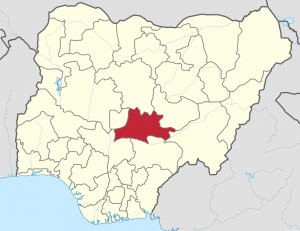Source: www.morningstarnews.org
Date: May 2, 2023
Pastor’s house among at least 86 homes burned down.
By Our Nigeria Correspondent

Nasarawa state, Nigeria. (Uwe Dedering, Creative Commons)
ABUJA, Nigeria (Morning Star News) – Fulani herdsmen and other terrorists on April 16 killed 12 people in attacks on predominantly Christian villages of central Nigeria that continued until April 19, sources said.
The assailants burned down the house of a pastor and other homes belonging to Christians in the attacks on Tattara Mada, Migini, Angwan Barau and other villages in Kokona County, Nasarawa state, area residents said.
“The house of the pastor of the ECWA [Evangelical Church Winning All] local congregation in Tattara Mada village was burned down, and dozens of other houses belonging to Christians there were also destroyed by the herdsmen,” the Rev. Danladi Ndoh, village resident and chairman of the ECWA Angwan Takwa District, told Morning Star News by phone. “Hundreds of our church members have been displaced, and this is aside from the 12 Christians killed.”
Area resident Chorio Musa identified the assailants as Fulani terrorists.
“The victims were murdered like animals, while some inhabitants of these communities are still missing,” Musa said in a text message to Morning Star News. “Valuables worth millions of naira have been lost. More than 50 houses have been burnt down to ashes, and food and cash crops were burnt to ashes, too.”
Survivors were stranded without any assistance from the Nasarawa state government, he said.
Pastor Elisha Tangwai said the entire village of Tattara Mada was in confusion after the killings on April 16.
“Let us pray for God’s intervention, for peace to be restored and for sanity to prevail in this community,” Pastor Tagwai said in a text message to Morning Star News.
Pius Kyubeh of the Mada Development Association said 86 homes were destroyed in area communities.
“Tattara Mada is a settlement which predominantly has a collection of thousands of Mada Christians adjoining with other villages like Kama Yanda, Kama Madaki, Ngah Habu, Angwan Barrau, Angwan Takpa, etc.,” Kyubeh said. “These attacks carried out by armed Fulani against unarmed Mada Christians of Tattara Mada and environs is the height of unbridled terrorism, as has been perpetrated in other parts of central Nigeria.”
Kyubeh said that in his team’s visits to the area, villagers told them no fewer than 12 Christians were killed by well-armed Fulani herder/militias.
“Many Christians have been rendered homeless, and in some cases, Christians have been forced to flee from their homes,” he said.
Nanham Nansel, spokesman for the Nasarawa State Police Command, said in a press statement that security personnel were deployed to the area.
Nasarawa Gov. Abdullahi Sule released a statement asserting, “It is not only the Tattara community that is affected. There’re also other communities, Angwan Takpa, Angwan Ayaba and other surrounding communities, that have been displaced.”
Nigeria led the world in Christians killed for their faith in 2022, with 5,014, according to Open Doors’ 2023 World Watch List (WWL) report. It also led the world in Christians abducted (4,726), sexually assaulted or harassed, forcibly married or physically or mentally abused, and it had the most homes and businesses attacked for faith-based reasons. As in the previous year, Nigeria had the second most church attacks and internally displaced people.
In the 2023 World Watch List of the countries where it is most difficult to be a Christian, Nigeria jumped to sixth place, its highest ranking ever, from No. 7 the previous year.
“Militants from the Fulani, Boko Haram, Islamic State West Africa Province (ISWAP) and others conduct raids on Christian communities, killing, maiming, raping and kidnapping for ransom or sexual slavery,” the WWL report noted. “This year has also seen this violence spill over into the Christian-majority south of the nation… Nigeria’s government continues to deny this is religious persecution, so violations of Christians’ rights are carried out with impunity.”
Numbering in the millions across Nigeria and the Sahel, predominantly Muslim Fulani comprise hundreds of clans of many different lineages who do not hold extremist views, but some Fulani do adhere to radical Islamist ideology, the United Kingdom’s All-Party Parliamentary Group for International Freedom or Belief (APPG) noted in a recent report.
“They adopt a comparable strategy to Boko Haram and ISWAP and demonstrate a clear intent to target Christians and potent symbols of Christian identity,” the APPG report states.
Christian leaders in Nigeria have said they believe herdsmen attacks on Christian communities in Nigeria’s Middle Belt are inspired by their desire to forcefully take over Christians’ lands and impose Islam as desertification has made it difficult for them to sustain their herds.
